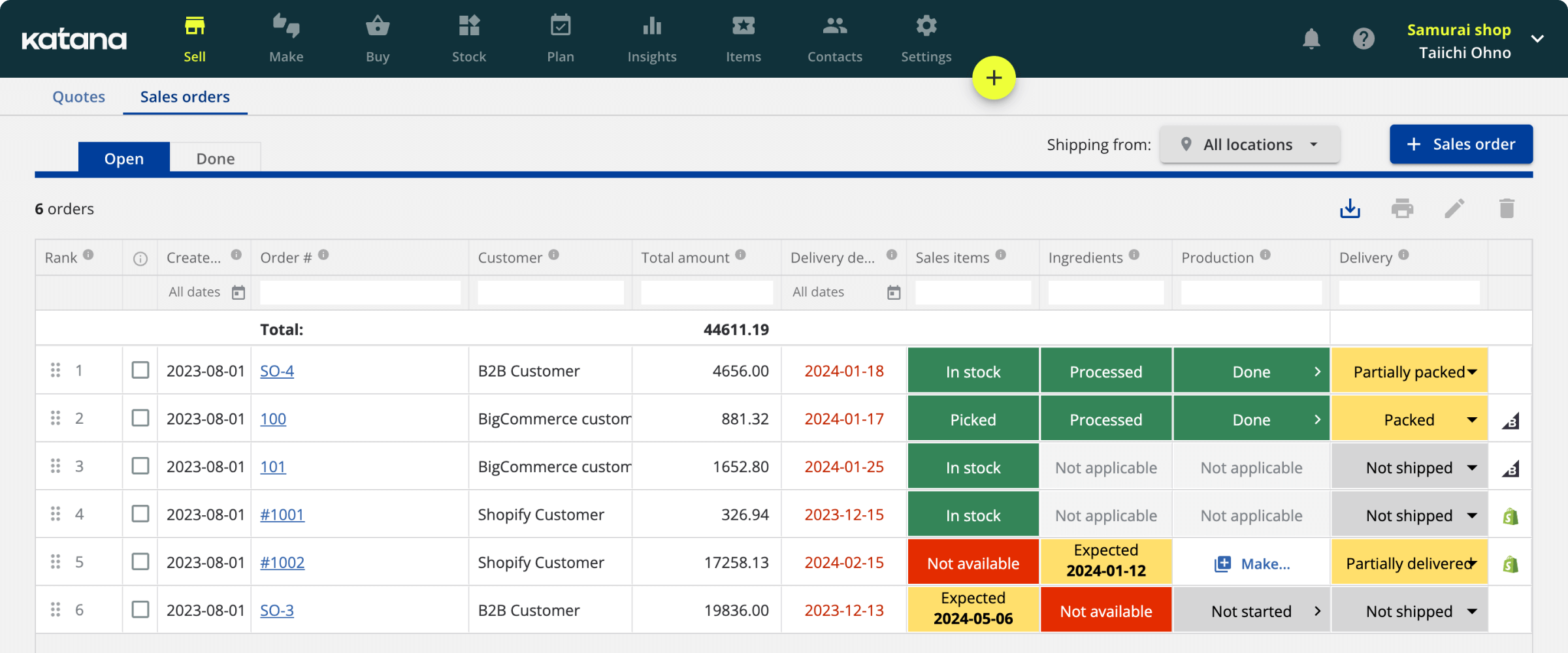AI for inventory management explained
Explore how AI for inventory management can free up your staff by handling mundane tasks and improve accuracy for forecasting and supply chain optimization.

Henry Kivimaa

If you’ve kept an eye on tech trends lately, you’ve probably noticed AI popping up in just about every corner of business news. It’s either taking over, revolutionizing, or flat-out rewriting how we do things (or so the headlines say). But behind the noise, there are actually some solid examples of AI making things easier, especially when it comes to keeping businesses running smoothly. Let’s talk about one area where AI is quietly changing things for the better — managing inventory.
For any business handling physical products, figuring out what stock to keep on hand is a tricky balancing act. You want enough to meet customer demand, but too much can tie up funds and storage space. Predicting demand and getting things to line up just right is easier said than done, but AI is starting to help bridge the gap between planning and reality.
In this article, we’ll get into how AI is helping businesses get a better handle on inventory. It’s less about big promises and more about practical ways to keep shelves stocked, costs down, and customers happy.
The role of AI in inventory management

Companies are constantly on the lookout for ways to gain an edge and improve their operations. Artificial intelligence has emerged as a powerful ally in this quest, offering innovative solutions to longstanding inventory management challenges.
Artificial intelligence is not a single, monolithic technology but a spectrum of capabilities that enable machines to mimic human intelligence, including learning from data, making predictions, and automating tasks.
AI can improve multiple different areas in inventory management, ranging from real-time data analysis to automated decision-making. This technology can process vast amounts of data quickly, accurately, and without fatigue, making it an invaluable tool for optimizing inventory.
AI for inventory management can be applied to a wide range of industries, from retail and ecommerce to manufacturing and logistics:
- Retail — AI-powered retail inventory systems help predict consumer demand, allowing businesses to maintain optimal stock levels and avoid overstock or stockouts.
- Manufacturing — AI can enhance production planning by optimizing the supply of raw materials and components.
- Logistics — AI can streamline route optimization, leading to cost savings and timely deliveries.
Employing AI for inventory management in the industries mentioned comes with many advantages, including:
- Accuracy — AI can effortlessly process vast datasets and make predictions with a high degree of accuracy, reducing forecasting errors and making sure that the right products are in stock.
- Real-time data analysis — AI systems can continuously monitor inventory levels, sales trends, and other relevant data in real time, allowing for proactive decision-making.
- Automation — Routine inventory tasks, such as order placement and reordering, can be automated, allowing employees to focus on more strategic activities.
- Cost reduction — Optimized inventory levels and streamlined operations minimize wasted resources and can lead to significant cost savings for businesses.
- Enhanced customer satisfaction — AI helps businesses meet customer demand by ensuring products are available when needed, leading to improved customer satisfaction.
As you can see, if used correctly, AI is not just a buzzword. It’s a transformative technology reshaping how businesses manage their inventory, ultimately driving efficiency and profitability.
Want to learn how to incorporate AI into your business?
Rainar from Katana Cloud Inventory discusses how AI impacts businesses and how it can be implemented to improve manufacturing operations.

Key AI techniques for inventory management
The previous section covered the role of AI in inventory management and its potential advantages. Now, let’s delve into the specific AI techniques and algorithms at the heart of transforming traditional inventory management processes.
Inventory forecasting
One of the most significant applications of AI in inventory management is using machine learning algorithms for inventory forecasting.
Machine learning models analyze historical sales data, customer trends, and external factors to predict future demand with remarkable accuracy. These algorithms can adapt and improve over time, making them increasingly precise as more data becomes available.
Machine learning-based forecasting minimizes overstock and stockout situations, ultimately saving businesses money and ensuring customer satisfaction.
Demand prediction
Predictive analytics is a crucial tool for understanding customer demand. It combines historical data, real-time information, and market trends to provide a comprehensive view of demand patterns.
AI-driven predictive analytics can help businesses anticipate fluctuations in demand and respond proactively by adjusting inventory levels, production schedules, or supply chain operations.
Inventory segmentation
Inventory segmentation techniques, like ABC inventory, allow businesses to categorize their products based on various factors like demand patterns, shelf life, and profitability. This segmentation enables targeted management strategies.
High-demand, short-shelf-life products, like perishable goods, require different management techniques than slow-moving, durable items, like furniture. AI can ensure that the right products receive the right attention, saving time and resources.
These AI techniques are not mutually exclusive, and many businesses combine them to create a holistic inventory management solution to suit their specific needs. The result is a dynamic and adaptable system that evolves with changing market conditions and customer preferences.
AI amongst ecommerce sellers
Katana and Worldwide Business Research surveyed 100 SMB Shopify merchants to understand their key challenges and how they plan to implement inventory software and AI to overcome them. Here are some key takeaways:
- According to the analysis, the adoption of user-friendly inventory management systems and the integration of artificial intelligence into business operations will be pivotal strategies for ecommerce businesses in 2024.
- 94% plan to incorporate artificial intelligence into their business operations in 2024.
- 30% said their two most significant focus areas in 2024 leveraging new automation technologies and artificial intelligence
- In addition to new technology tools, many ecommerce merchants will be looking to artificial intelligence (AI) to streamline their operations, automate tasks, reduce complexities, and better manage costs. At 97%, almost all the respondents are implementing AI as part of their business operations in 2024.
Benefits of AI in inventory management
The implementation of AI in inventory management brings along many benefits that not only enhance the efficiency of operations but also have an impact on a business’ bottom line. Let’s explore these in more detail.
Cost reduction
One of the most compelling reasons businesses adopt AI in inventory management is the potential for significant cost reduction.
AI-driven inventory optimization minimizes holding costs by ensuring businesses stock the right quantity of products. Overstocking and stockouts are costly problems that AI can help mitigate.
Optimized inventory levels let companies allocate resources more effectively, reduce storage costs, and improve profitability.
Improved customer satisfaction
In the age of instant gratification fueled by Amazone Prime’s guaranteed one-day shipping, and an endless stream of funny cat videos on TikTok, customers expect products to be available immediately when they want them. AI in inventory management ensures that is the case.
Accurate demand forecasting and real-time monitoring reduce out-of-stock instances, preventing customers from turning to competitors and preserving brand loyalty.
Enhanced decision-making
AI-powered systems process and analyze copious amounts of data in real time, providing valuable insights and recommendations. Businesses can make informed decisions based on these insights, like
- Optimizing reorder points
- Managing supplier relationships
- Adjusting pricing strategies
The result is smarter, data-driven decision-making that contributes to overall business success.
Efficient resource allocation
AI’s ability to automate routine inventory tasks, such as order placement and reordering, allows businesses to allocate their human resources more efficiently. Employees can focus on strategic activities, such as supplier negotiations, marketing, and customer service, while AI handles the day-to-day inventory operations.
Inventory accuracy and reduction in errors
AI systems are exceptionally accurate and reliable when used accordingly, reducing the margin for error in inventory management. This accuracy translates into precise product tracking, minimized data entry errors, and reduced discrepancies between physical and recorded inventory.
Scalability and adaptability
AI-driven inventory management systems can scale with a business’ growth. As operations expand, AI can adapt to changing demand patterns and new products.
The flexibility of these systems ensures that they remain relevant and effective, whether a business operates on a small scale or as a global enterprise.
Download the ultimate inventory management guide
A comprehensive ebook with everything you need to know about inventory management.
Next, we’ll explore the challenges and considerations of implementing AI in inventory management, ensuring a comprehensive understanding of the technology’s implications and requirements.
Challenges of AI for inventory management
While adopting artificial intelligence in inventory management offers many benefits, it’s important to acknowledge the challenges associated. Understanding these factors is crucial for businesses that want to integrate AI into their inventory management processes.
Data quality and availability
AI systems heavily rely on data. Inaccurate, incomplete, or outdated data can lead to flawed predictions and suboptimal decision-making.
Maintaining data quality is a challenge companies must address, often requiring data cleansing, integration, and consistent updates.
Additionally, some businesses may lack the historical data required for accurate AI-driven forecasting.
Implementation costs
Implementing AI solutions can be a substantial investment. The costs include acquiring the necessary hardware and software, as well as training personnel to use and maintain the systems. Smaller businesses may find these costs prohibitive, although there are now more accessible cloud-based AI solutions available.
Skilled personnel
The successful implementation of AI in inventory management often necessitates personnel with specialized skills. Data scientists, machine learning engineers, and AI experts are in high demand.
Recruiting or upskilling existing employees to handle AI systems can be challenging for some businesses.
Integration with existing systems
Many businesses already have established inventory management systems in place. Integrating AI solutions with these legacy systems can be complex and may require custom development.
Ensuring a seamless connection between AI and existing processes is a critical consideration.
Security and privacy
Using AI involves handling sensitive data, which presents security and privacy concerns. Ensuring that AI systems are robust against cyber threats and that customer and business data is protected is paramount.
While these challenges may seem daunting, they should not deter businesses from exploring AI for inventory management. Instead, they serve as points of awareness and preparation.
Inventory management with Katana

AI for inventory management is still evolving, and the most effective way to get started is by targeting routine tasks that consume valuable time. Instead of diving into full-scale forecasting, begin by automating sales order creation. Katana’s AI (KAI) can help by taking unstructured purchase requests from emails and transforming them into sales orders, reducing manual entry and freeing up your team.
KAI currently offers the following:
- Sales order assistant — Converts purchase requests into sales orders, saving users time and ensuring data accuracy.
- Sales widget — Offers a real-time overview of your operational and strategic sales insights within the platform, giving you easy access to essential metrics without relying on external reports.
- Sales insights — Enables customized data queries. You can ask KAI questions like “Show me revenue trend,” and it responds with graphs for immediate, data-driven insights.
In addition to these AI tools, Katana provides:
- Real-time inventory management — Get detailed insights into inventory levels from raw materials to finished goods, allowing for timely and effective control.
- Seamless integrations — Connect easily with ecommerce platforms like BigCommerce, WooCommerce, and Shopify to manage online sales in sync with your inventory.
- Mobile access — As a cloud-based platform, Katana offers flexibility and connectivity, allowing you to adjust inventory or review metrics wherever you are.
- Production management — Optimize production with a bill of materials and operational plans that streamline workflow.
- User-friendly interface — An intuitive design for smooth onboarding, helping users transition from traditional systems effortlessly.
- Inventory planning and forecasting — Plan demand and set automated safety stock levels, using historical sales data.
By choosing Katana, you’re investing in an advanced platform ready to meet today’s needs and leverage AI’s potential as it continues to evolve. Want to learn more? Request a demo today to see how Katana can streamline your operations and simplify your inventory management.

Henry Kivimaa
Table of contents
inventory-management
Download the ultimate inventory management guide
A comprehensive ebook with everything you need to know about inventory management.
Get inventory trends, news, and tips every month
Get visibility over your sales and stock
Wave goodbye to uncertainty by using Katana Cloud Inventory for total inventory control
